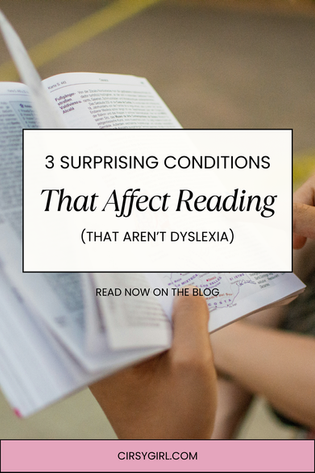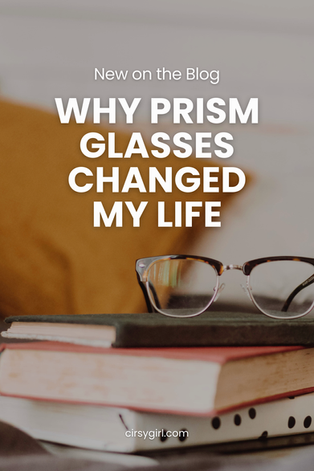Reading Disabilities: There's More Than Just Dyslexia?
- Cirsy Girl

- Mar 9, 2025
- 6 min read
Updated: Sep 25, 2025
As someone who has struggled with reading all of my life, this is a topic close to my heart. I am an avid reader, a lover of stories, and a writer. Growing up, I loved school (for the most part) and I was a very good student. But I also have dyslexia, convergence insufficiency, difficulty with eye-tracking, post-concussion syndrome, and CIRS. While these aren't all reading-specific conditions, they have all contributed to my reading difficulties over the years.
Throughout my elementary education, teachers tried to hold me back. School was a struggle despite how much I love learning. And tests were the worst because I never knew how much I'd be able to finish in the time allotted. Despite what some of my classmates, friends, and even teachers thought, getting A's and B's was a lot harder for me than it looked.
Struggling to read is hard. It is mentally, emotionally, and physically taxing. But as I grow older, I become more and more grateful for the way my brain works, even if it makes life a little harder sometimes.
So, what does it mean to have reading difficulties?
What the world tends to forget is that difficulty with reading comprehension is not limited to dyslexia. Many things can affect your ability to read. And while some conditions are more difficult to deal with, there are a few that are fairly simple to address with the right tools.
So, lets go over a few of the things that can affect your (or your child's) reading comprehension and how they differ (note that this is not a complete list of everything that may affect literacy).
Dyslexia: The Most Common Reading Disability
Most of us have heard the word and equate it with reading disability. But let's get specific about it. Dyslexia is a disruption in the neural pathways connecting the visual, auditory, and language centers of the brain. This leads to difficulties involving phonetic/language processing. According to the Mayo Clinic, dyslexia manifests as "difficulty reading due to problems identifying speech sounds and learning how they relate to letters and words (decoding)."
For example, I read quite a bit slower than other people because it takes my brain longer to decipher (or decode) letters into words, associate them with sounds, connect them with definitions, and put them in context.
Symptoms of dyslexia can include:
Difficulty reading, including reading aloud
Slow and labor-intensive reading and writing
Difficulty spelling
Avoiding activities that involve reading
Mispronouncing names or words, or problems retrieving words
Problems processing and understanding what is heard
Problems remembering the sequence of things
Difficulties sounding out the pronunciation of unfamiliar words
Today, dyslexia is widely used to cover a range of symptoms and conditions, sometimes leading to misdiagnosis. To be clear, dyslexia starts in the brain and is a neurological condition.
Irlen Syndrome
Often misdiagnosed as dyslexia, Irlen Syndrome is a visual/perceptual processing disorder. This condition appears "to be caused by an interruption between the synaptic path from the eyes to the brain," as described by Louis Ricci in an article written for Exceptional Individuals LTD.
Some of the key symptoms are:
Light sensitivity
Slow or inefficient reading
Poor reading comprehension
Poor attention and concentration
Fatigue
Eye strain
Headaches and migraines
Poor depth perception
Unlike dyslexia, a key element of Irlen Syndrome is the eyes-to-brain connection. This difference means there are some simple solutions such as colored glasses, colored overlays, and changes in lighting that can significantly reduce the symptoms of Irlen Syndrome.
Eye-tracking problems
Eye-tracking is a person's ability to automatically move their eyes smoothly, quickly, and most importantly accurately. Good eye-tracking skills are key when scanning for information, following/tracking moving object(s), focusing while jumping from one target to another, and directing hand movements.
When a person experiences eye-tracking problems, they may experience slow, inaccurate, unreliable, and/or sometimes jumpy eye movements.
Symptoms can include:
Frequent loss of place and/or skipping lines while reading
Frequent drowsiness or sleepiness following short periods of reading
Confusing one word with another as the eyes skip around during reading
Habit of using a finger or marker or ruler as an aid during reading
Excessive head movement while reading, writing, or doing other close work
Seemingly careless errors during close work
Poor reading comprehension
Attention and/or behavior problems, specifically during reading or other close vision work.
I remember in school, these symptoms were addressed by using a ruler or piece of paper under the line of text that was being read so that I could tell what line I was on. But that isn't a practical solution for everyday life.
This condition cannot be addressed via surgery. And while glasses and visual aids can be helpful, they won't remedy eye-tracking problems. According to Toledo Vision Therapy, visual therapy and eye exercises are the best way to address eye-tracking issues.
I can attest that eye exercises can be effective in strengthening your ability to track. However, like most therapies, it takes time, patience, and continual practice to improve and maintain.
Convergence Insufficiency (CI)
Previously known as Convergence Disorder, CI is when your eyes fail to focus on the same point in space. Essentially, it is an eye muscle coordination problem.
Think of it like this: you go to a 3D movie, but you don’t have 3D glasses. The movie is still watchable, but there is a slight double for most of it. You lack depth perception, and everything has a flat quality thats only worsened by the slight doubling effect. By the end of the film your double vision has gotten worse, your head is achey, and you may even start to feel a little woozy.
According to Toledo Vision Therapy, studies show that this condition affects 5% of Americans across all populations, racial groups, and cultures. The tricky thing about CI is that you can test as having 20-20 vision during an eye exam and yet still have convergence insufficiency. This can make getting a diagnosis from your eye doctor difficult (if not impossible) if they aren’t measuring your convergence abilities during your exam.
Due to the nature of CI, it heavily affects a person's depth perception. In addition, the strain this condition puts on the brain and body can affect more than just a person's vision, including concentration, comprehension, executive function, visual-motor-cognition functions, and even digestion and immune functions.
Symptoms can include:
eyestrain
headaches
blurred vision or double vision
loss of place and concentration while reading or doing close work
words and letters moving around while reading
slow and fitful reading and writing
motion sickness and/or vertigo
bumping into things
clumsiness with hand-eye coordination activities or sports
heightened anxiety
excessive muscle tension in peripheral muscles
digestion problems
For me, this manifested most notably as a fear of falling (not to be confused with a fear of heights), bumping into things all the time, extreme caution while driving, inability to read street signs even with prescription glasses, an inability to catch anything tossed my way, vertigo, and constant slight double vision. I now know that this was all caused by CI and the resulting lack of depth perception.
This condition is most commonly and successfully treated with vision therapy and eye exercises. But what made the biggest change in my life in regards to this condition was getting my first pair of prism glasses. It was like putting on 3D movie glasses, but for the whole world. Suddenly, I had depth perception, which took some getting used to (imagine me taking comically high and cautious steps because the ground looked so different lol). But once my brain recalibrated, it made life so much easier and reduced my symptoms significantly.
Some doctors believe that prism lenses are a poor solution because they allow your eyes to be lazy. They believe that just training and strengthening your eye muscles is the best option. However, while eye exercises are a great tool, they don't always work for everyone. For someone like me, who suffered from all of the above symptoms and struggled to see improvement with exercises alone, prism lenses were a lifesaver. And after wearing them daily for over five years, I do not believe my vision has gotten worse (and my eye exams have confirmed this).
Final Thoughts
Reading and reading comprehension are complicated. It’s not just a brain, or eye, or neurological function. It's all three and probably more. I’m no doctor, but I’ve lived with a medical professional long enough to learn a thing or two. And experience has taught me that our bodies and our brains are miraculous and mysterious things. Even with all the leaps and bounds we’ve experienced in medicine, reading disabilities can still be quite mysterious to the majority of us (even me).
As I warned in the beginning, this is not a complete list of all the things that can affect you or your child’s reading comprehension. It is merely the beginning of a growing list. But it is a good place to start, and I hope that you find it useful in defining and distinguishing these different conditions. I have linked all the articles I referenced, along with a few more, below under Resources.
And remember that these are not mutually exclusive conditions. They can be experienced all at once in a jumbled mess that can be hard to untangle. Hopefully, this article can help decipher some things as we all learn more together.
Xo,
Cirsy Girl
Resources:
Pin for later and help spread awareness and solutions <3











Comments